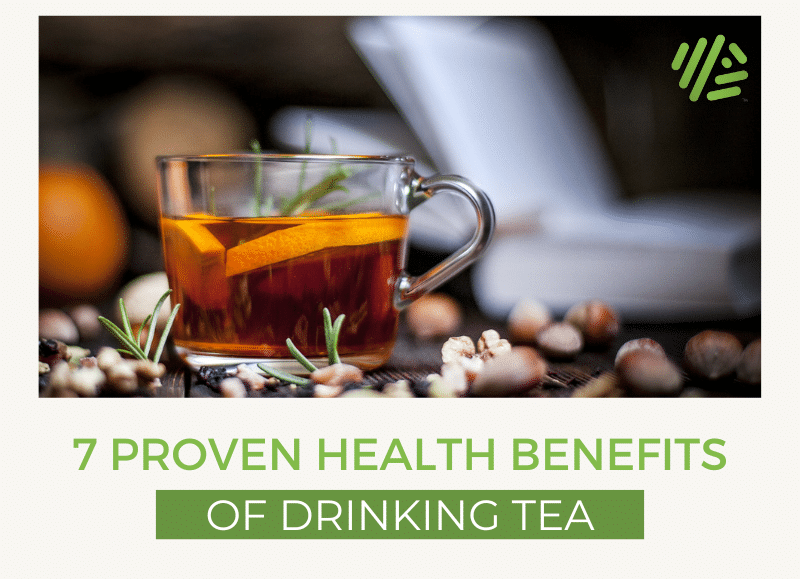7 Proven Health Benefits of Drinking Tea
Genes Mentioned

Contents
- Camellia sinensis – the tea plant
- #1. Tea may reduce the risk of cancer
- #2. Tea can decrease diabetes and heart disease risk
- #3. Tea may aid in weight loss
- #4. Tea can improve our mental function
- #5. Tea may improve our bone health
- #6. Tea can improve our oral health, too
- #7. Tea can take care of our gut
- Which kind of tea is healthiest?
If you’re a big tea drinker, you most likely have a “go-to” tea. Maybe you drink green tea daily, or perhaps you’re getting into white tea because you’ve heard its antioxidant levels are off the charts. If you’re strolling down the tea and coffee aisle of your grocery store, you probably notice boxes upon boxes of tea varieties. But truly, there are only about a half-dozen types of teas (not counting herbal) based on how the leaves are processed.
Camellia sinensis – the tea plant
Tea comes from the leaves of Camellia sinensis, an evergreen plant mainly found in tropical or subtropical climates. When tea leaves are picked, they will begin to wilt and oxidize unless they are immediately dried. The oxidation and wilting process is what gives us different types and flavors to our tea, in addition to varying antioxidant structures. For example, green tea is not wilted nor oxidized, while white tea is wilted and unoxidized. Although tea is a popular beverage in other countries, only 15% of Americans drink tea on a typical day — yet throw back at least one can of soda daily. 1 In this post, we’ll discuss seven (7) proven health benefits of tea, and why you might want to add a hot cup of tea to your morning routine.
#1. Tea may reduce the risk of cancer
All types of tea are packed with antioxidants called polyphenols. The high level of flavonoids in tea, a type of polyphenol, in particular, are effective free radical scavengers. 2 These antioxidants help protect cells and tissues and reduce oxidative stress. Oxidative stress can lead to inflammation, which in turn can be a factor for developing cancer, diabetes, cardiovascular disease, and other ailments. 3
Green tea has more polyphenols than black tea
Green tea contains high levels of a special class of polyphenol called catechins. Because catechins are oxidized or condensed to theaflavins and thearubigins during fermentation, more catechin is found in green tea than black or Oolong — particularly (−)-epigallocatechin gallate, or EGCG. 4 5 EGCG has been shown to have a number of anti-cancer properties, in addition to anti-diabetic and anti-obesity ones. 6
#2. Tea can decrease diabetes and heart disease risk
Green tea may reduce cholesterol and blood pressure, which can in turn decrease your risk of heart disease. In one study of both mice and human subjects, green tea lowered blood sugar in diabetic mice while also promoting glucose metabolism in healthy human volunteers. 7 Another study of more than 17,000 people across 25 communities in Japan found that after five years, those who drank green tea and coffee had a lower risk for type 2 diabetes — the most pronounced associations found in women and overweight men — while drinkers of black and Oolong teas saw no association between their beverage of choice and diabetes risk. 8 While anti-diabetic properties of white tea haven’t been fully explored, one study showed that when pre-diabetic rats consumed white tea daily, their health improved. 9
#3. Tea may aid in weight loss
One of the popular benefits of green tea includes promoting weight loss by boosting metabolism and decreasing fat absorbed in your diet. Here’s where EGCG comes in. Insulin influences how we metabolize and store energy. Although several polyphenols in tea enhance insulin activity, most can be attributed to EGCG (which is found the most in green tea). 10 A recent human study, while it researched the effects of EGCG on energy expenditure on only six obese men, found that EGCG could increase fat oxidation in men and may therefore lead to weight loss. 11 In studies where green tea extract has been supplemented in the diet of overweight adults who also were completing a 12-week exercise program, the overweight adults consuming green tea catechins saw a greater loss in abdominal fat than those consuming a control beverage with just caffeine. 12 A meta-analysis of 11 studies on green tea and weight loss found at least a small positive effect on weight loss and weight maintenance. 13
#4. Tea can improve our mental function
We know that tea, because it has caffeine in it, can help deliver a pick-me-up if we’re starting to slog through the afternoon. It also can boost our mood, as John found out when supplementing with L-theanine, an amino acid found in tea. But did you know that all teas have been shown to improve mental alertness and cognitive function? One study of 716 older Chinese adults found that drinking black, Oolong, or green teas helped them with their attention, memory, executive function, and information processing. 14 Coffee lover? Unfortunately, this study found no association between coffee consumption and cognitive function. See also: Caffeine consumption: What you need to know for tomorrow morning,
#5. Tea may improve our bone health
Researchers have found that bone mineral density (BMD) can be affected by chemical compounds like caffeine, but also much of the good stuff that’s in tea. For example, in a review of more than 500 habitual tea drinkers over age 30 who had been consuming tea regularly for 6 to 10 years compared to non-tea drinkers, researchers saw higher lumbar-spine BMDs. Those who drank tea for more than 10 years had the highest BMDs. 15 It’s important to note that high caffeine intake — coffee, mainly, because it has so much more of it than tea — has been associated with reduced bone health in some people. If you have VDR gene polymorphisms, you may want to pay extra attention to this post by Aaron: How VDR genes influence osteoporosis and bone health.
#6. Tea can improve our oral health, too
The last time you smiled at yourself in the mirror or brushed your teeth, did you ever think about how what you last drank may have affected those pearly whites? The good news is, tea consists mainly of tannins, and flavonoids, which can be good for oral health. Green tea has been shown to reduce plaque and gingivitis. 1 Tea has antibacterial properties, which can be helpful in suppressing the development of dental cavities. 16
#7. Tea can take care of our gut
According to a review of the role of polyphenols in gastrointestinal diseases, oral antioxidants, including green tea, were shown to improve inflammatory bowel disease in animals. The EGCG in green tea also can treat other gut damage brought on by oxidative stress, including peptic ulcer disease, and reduce the risk of pancreatic cancer and colorectal cancer. 17 For those worried about their liver, green tea can improve liver histology and liver enzymes. A study of 17 patients with non-alcoholic fatty liver disease found that those who consumed green tea with high-density catechins improved liver fat content and inflammation by reducing oxidative stress. 18
Which kind of tea is healthiest?
We spend a lot of time here at Gene Food, and in this post, talking about green tea. But is green tea really the best? White tea is one of the rarest and least-handled teas, so less is known about it. However, white tea could have even higher antioxidative properties than green tea, making it more beneficial to consume. 19 It also may have more catechins, depending on how it’s sourced and processed. 20 So, how do we stack up the kinds of tea fairly against each other? White tea has a lot of beneficial antioxidants — potentially many more than other teas — and it also has a little less caffeine. But green tea has been studied time and again and has a lot going for it. Which tea you drink really depends on your preference, and we’re not going to argue with you if you choose white over green, or decide one day to switch to Oolong. However, the benefits of green tea are best documented at this time, so we’re going to go Team Green.




Good post! I have been interested lately in the “delivery mechanism” for caffeine and how antioxidants in tea and coffee confer a health benefit independent of the caffeine intake. For example, this study which found that both decaf and regular coffee increased telomere length, while plain old caffeine consumption decreased telomere length (telomere length has been linked to longevity). As far as tea is concerned, I am a white tea guy myself these days.
Great mention on telomeres, John!